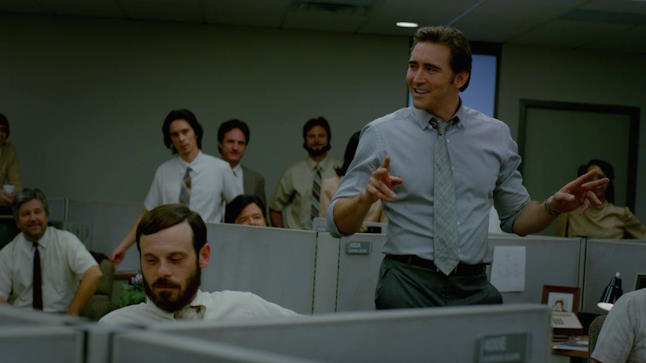
Halt and Catch Fire Essays + 2/1/22
Season 1 Episode 2
Analysis of Halt and Catch Fire S1:E2. Why did this episode play out the way it did? And why did Joe smash up a stereo shop? What we can learn by putting ourselves in the shoes of the writers'

Analysis of Halt and Catch Fire S1:E2. Why did this episode play out the way it did? And why did Joe smash up a stereo shop? What we can learn by putting ourselves in the shoes of the writers'
As a writer, much of my motivation for this series of essays is to dive into the narrative structure of Halt and Catch Fire. What is this episode doing to move us forward? Why did the characters do what they do? Why are the scenes sequenced the way they are? It's well said that in order to be a better writer you have to read -- but for a more honest vein of wisdom I would rephrase this to: in order to be a better writer, deconstruct what you read and ask "Why this, why now, why here?".
In this episode, we see the result of Joe's strategy of dealing with IBM. While sticking to the script sends the lawyers packing, Big Blue returns fire by stealing Cardiff Electric's top customers. For a moment, consider why the writers took this path with the IBM narrative. If the writers had gone forward with a long Cardiff v IBM legal battle, the show would have dragged into a tale whereby our heroes build a computer while simultaneously dealing with an endless court-case. Is it a legal drama or a tech tale? It's a path lacking punch and diluting the vision of the season. How do we ratchet up the tension so our characters aren't just building a computer by Christmas? The writer's solution is to hand us a time-bomb: "IBM took 3 of our top 5 customers, accounting for 68% of total billing. At this rate, we have 2 months to live." With this clever angle, the writers could drop IBM from the cast of characters to worry about while keeping a terrific plot point that adds an ever-present sense of urgency for the rest of the season.
The characters are understandably devastated.
Gordon, fresh off of gushing to his wife Donna, "I have good reason to believe we'll be ok", again finds himself on the precipice of professional disaster -- something we have already established as being the one thing Donna is tremendously afraid of. Cameron, having just dropped out of college, finds herself working on "a boring beige box no one will give a shit about" while also discovering Joe and Gordon planned to lay her off when her contribution was complete. And Joe finds his plan has reversed back on him and shattered his internal self-image, right as it was beginning to actualize.
As I watched this episode for likely the fifth time, I paid close attention to a scene that has always confused me: Joe's journey into a floundering stereo shop. The salesman, while showing Joe his inventory, recognizes Joe as a fellow salesman. Joe asks the man, "Why are you going out of business?"" to which the salesman blames stagflation and no-one wanting to buy stereos despite them being incrementally better than last years models. Joe realizes something and becomes increasingly agitated, turning up all the stereos and throwing things around the storeroom. In all the chaos, his key line is lost: "If we didn't see it coming, what are we doing here?"". The purpose of this scene, as much as I can decipher, is Joe realizing that his job is to be a visionary -- to be the wave of innovation, not the salesman that is crushed by it. Joe returns to the office, enlightened, and pivots the direction of the computer project. It's not well received by Gordon or Cameron, but the scene progresses to the completion of the idea: "We are all unreasonable people," Joe says. "We have to fit the world to our vision, not the other way around." It's worth saying again: the purpose of this sequence of scenes was for us to change Joe from being a salesman to a visionary. In the stereoshop, the writers very specifically have the shop-keeper identify with Joe "You're a salesman. I knew it. I can always tell my type."" to which Joe offers no objection. Then, as the scene progresses, Joe sees himself in the soon-to-be-out-of-business shop-keeper and realizes his fate will be identical. Unless, of course, Joe shapes the world to his vision.
So, stepping back, this episode was a keystone for the rest of the season. Its purpose was to end the honeymoon and set the tone and pace from here on out. The stakes are raised; the tension is elevated and the characters are established as being wildly incompatible but married by necessity. A good study in narrative structure.